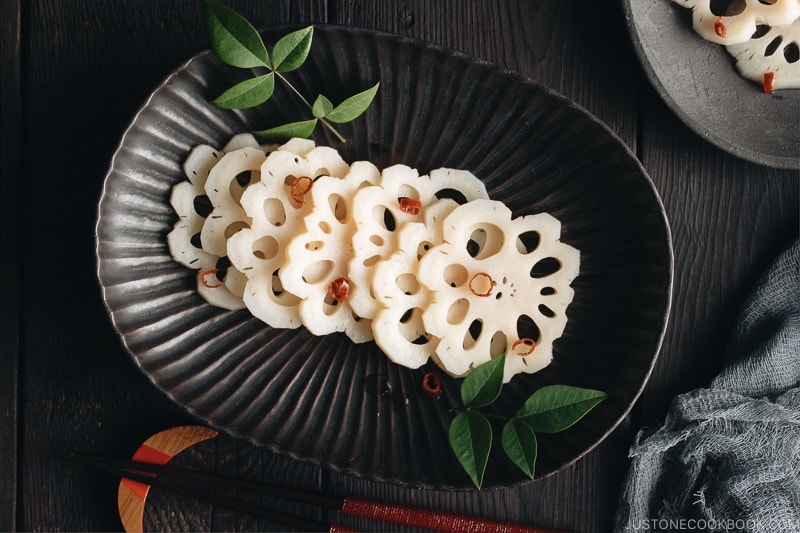
Marinated in a sweet vinegared sauce, Pickled Lotus Root called Su Renkon (酢れんこん) is one of popular Osechi Ryori, the Japanese New Year Food.
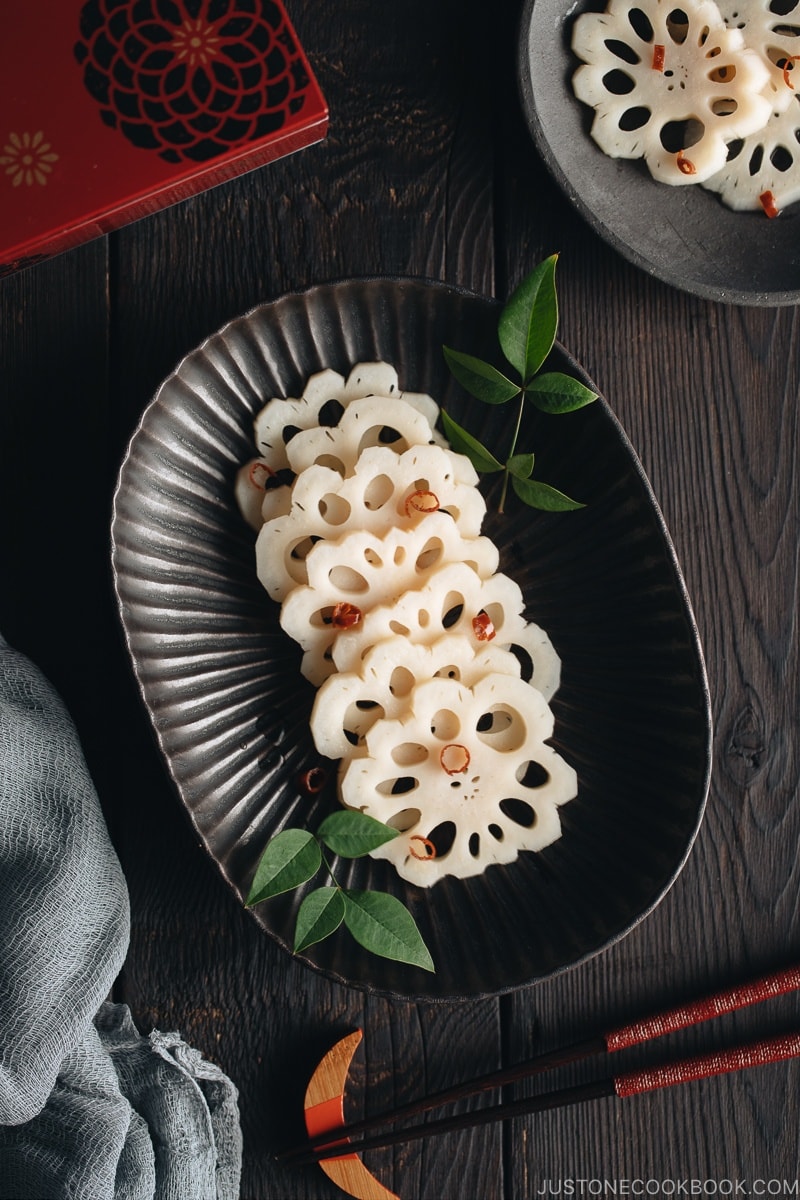
I always love lotus root for its beautiful natural design. The pale brown stem may look just like any other plant roots and characterless from the outside, but when you slice it open, the root reveals uneven tiny holes that are ready to surprise and delight. When sliced thinly, they even resemble delicate flowers.
Lotus root also has an incredibly unique texture because even after cooking, it retains its crunchiness while staying tender. Today I’m going to share Pickled Lotus Root recipe, or we call Su Renkon (酢れんこん) in Japanese.
What is Pickled Lotus Root (Su Renkon)?
Su Renkon (酢れんこん) is a pickled dish where sliced lotus roots are marinated in rice vinegar, sugar, salt, mirin, and red chili pepper. With a refreshing and piquant taste, this vinegared dish is great as a palette cleanser between heavily seasoned foods.
Because lotus root can oxidize after it is exposed to the air, we typically submerge it in the water with a little bit of vinegar or pickled in a vinegared sauce. This helps to remove any astringent taste and prevent the root from turning brown.
This dish is eaten all year round, but it is specially served as one of the Osechi Ryori, a Japanese New Year Food.
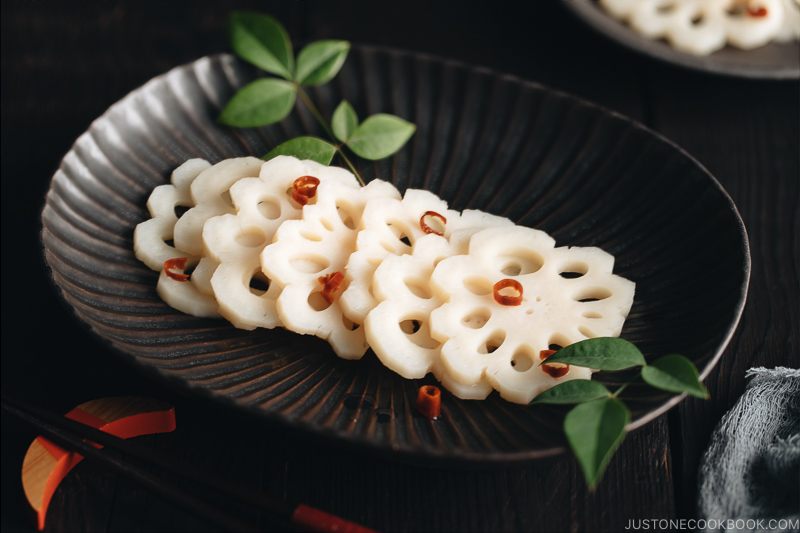
Pickled Lotus Root (Su Renkon) as Auspicious Food
Lotus root has been considered an auspicious food for the Japanese New Year because lotus root with its many holes is a symbol of an unobstructed view of the future. It also has many seeds, hence it’s been eaten to pray for the prosperity of descendants.
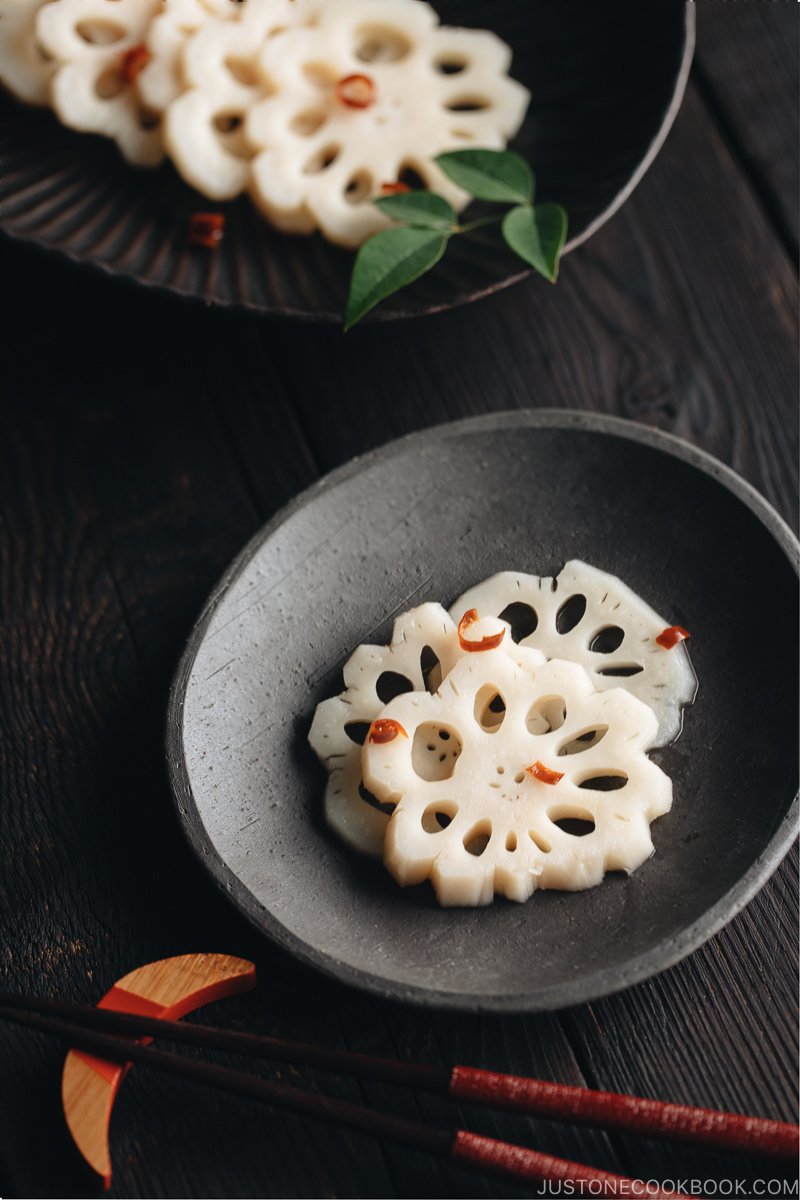
Optional – How to Make Flower Lotus Root (Hana Renkon)
You might be curious how we make this pretty flower pattern out of lotus root. It’s actually not so difficult, but you will need:
- Patience
- A very sharp paring knife
- Lotus root with even size holes
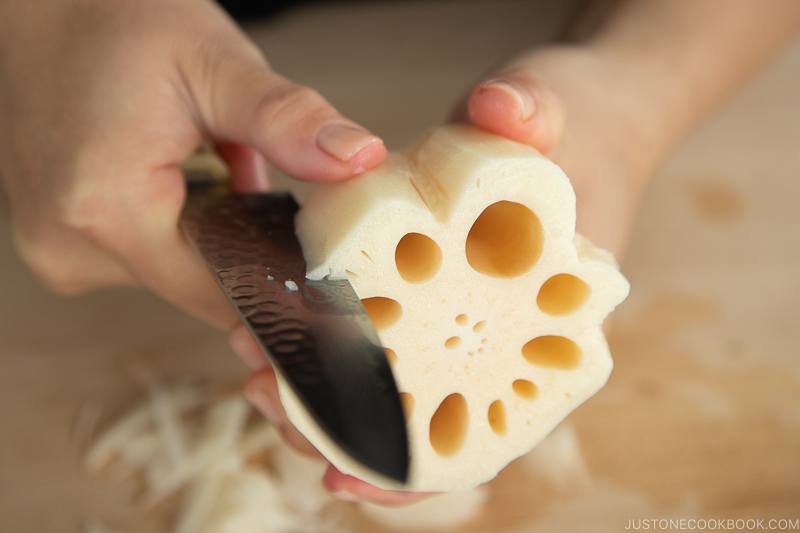
1. Cut lotus root into a 2-inch length so it’s easy to work with. Cut out the “V” shape between two holes.
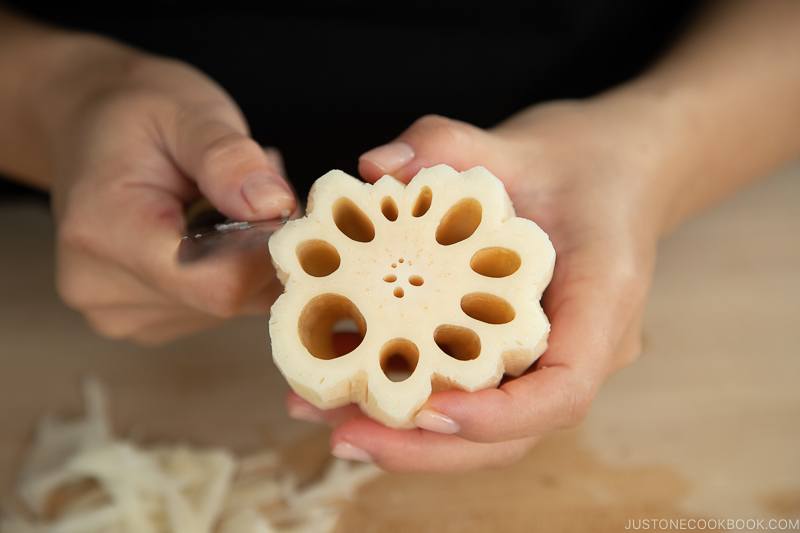
2. Remove the v-shape part and continue to next area between the holes.
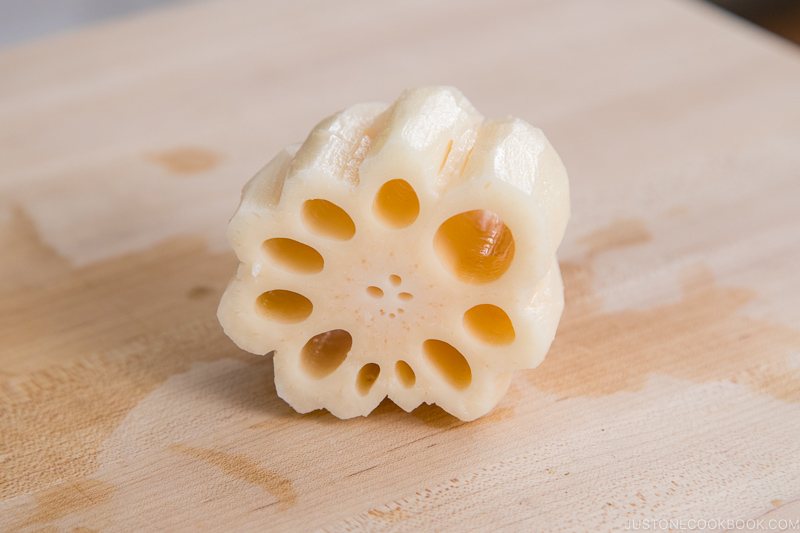
3. Now ready to cut into slices.
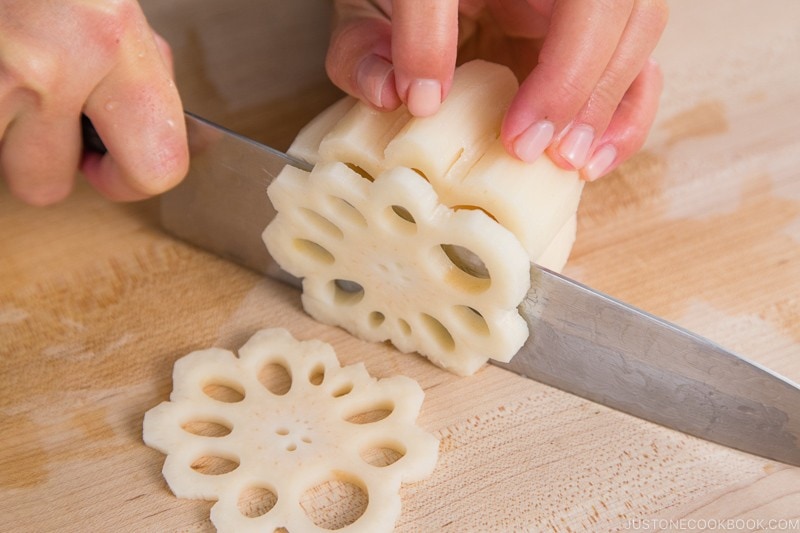
4. Slice into roughly 1/8 to 1/4 inch thick pieces.
Having a sharp knife helps you score the “V” shape and remove the excess part nicely. If you make a mistake, it’s okay. Move on to the next. Practice makes perfect.
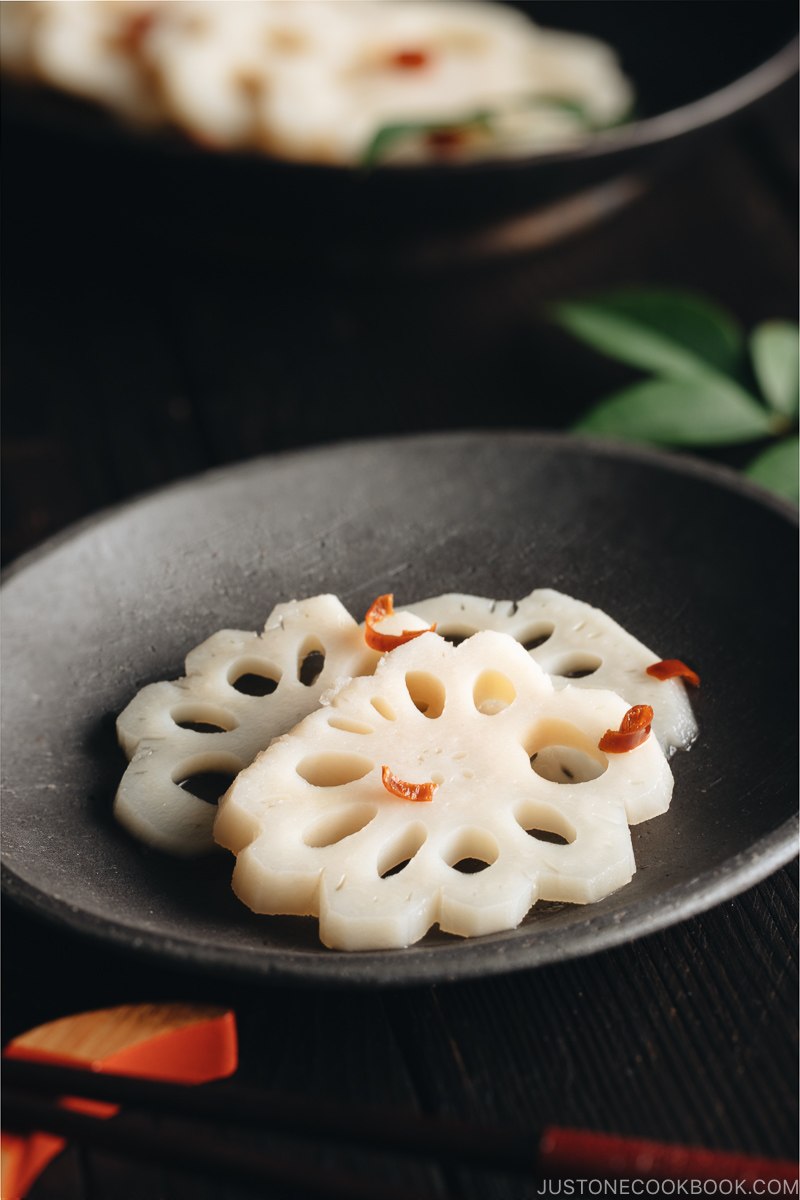
Other Lotus Root (Renkon) Dishes for the New Year’s Food
- Chikuzenni (Nishime) – root vegetables including lotus root are simmered along with the chicken.
- Kinpira Renkon – thinly sliced lotus root stir-fried and seasoned with sauce.
- Karashi Renkon – a mixture of miso and Japanese karashi hot mustard stuffed in lotus root, coated in a turmeric flour batter, and deep-fried.

Japanese Ingredient Substitution: If you want to look for substitutes for Japanese condiments and ingredients, click here.
Sign up for the free Just One Cookbook newsletter delivered to your inbox! And stay in touch with me on Facebook, Pinterest, YouTube, and Instagram for all the latest updates.
Pickled Lotus Root (Su Renkon)

Marinated in a sweet vinegared sauce, Pickled Lotus Root called Su Renkon (酢れんこん) is one of popular Osechi Ryori, the Japanese New Year Food.
- 1 lotus root (renkon) ((200 g))
- 1 tsp rice vinegar ((for lotus root))
- 1 dried red chili pepper
Seasonings
- ¾ cup water
- 1 piece kombu (dried kelp) ( (2” x 2” or 5 x 5 cm))
- ½ cup rice vinegar
- 3 Tbsp sugar
- ¾ tsp kosher salt
- Gather all the ingredients.
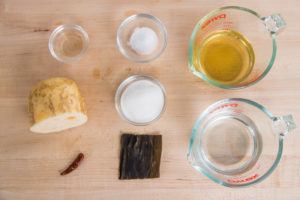
Prepare the Ingredients
- Soak the kombu in water. The image on the right is after 30 minutes.
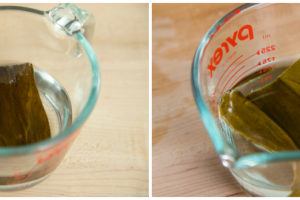
- Meanwhile, peel and cut the lotus root into ¼ inch pieces (0.6 mm). If you want to make lotus root into a flower shape, see the optional step below.
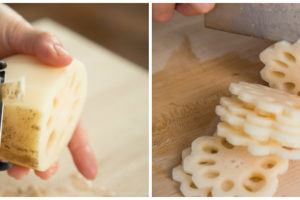
-
Add 1 tsp rice vinegar in 4 cups (1L) of water. Soak the lotus root slices for 5 minutes to prevent changing of color and to remove the astringent taste.
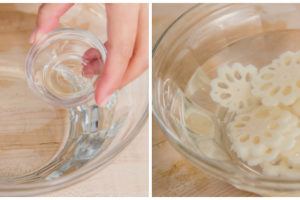
- OPTIONAL: Flower Shape Lotus Root (Hana Renkon)

- Cut the lotus root into 2-inch length so it’s easy to work with. Cut out the “V” shape between two holes. Remove the v-shape part and continue to next area between the holes.
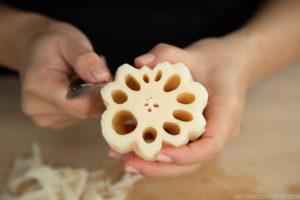
Cook Lotus Root
- In a medium saucepan, combine kombu dashi, ½ cup rice vinegar, 3 Tbsp sugar, and ¾ tsp kosher salt. Turn on the heat to medium heat and mix well.
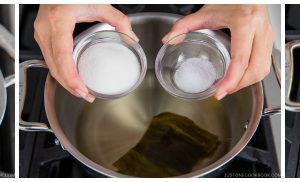
- Add the lotus root slices and spread out evenly.
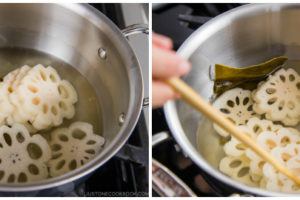
- Right before the sauce comes to a full boil, remove the kombu. Place an otoshibuta over.
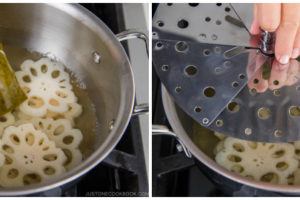
-
Cook with the otoshibuta for 5-8 minutes, or until the inserted skewer goes through smoothly.
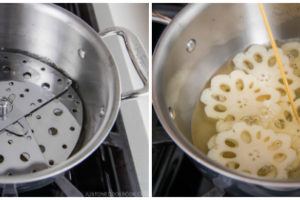
- Transfer the lotus root and sauce into an airtight container with a lid.
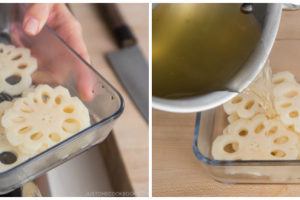
- Remove the seeds from red chili pepper (or keep some if you like it spicy), and slice into rounds.
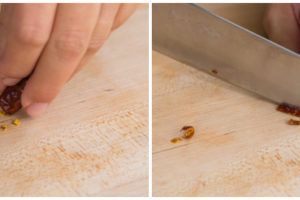
-
Place the red chili pepper rounds in the sauce. Let cool completely and store in the refrigerator for at least 6 hours so the flavors absorb completely. Enjoy chilled or room temperature. You can keep it for up to 5-7 days.
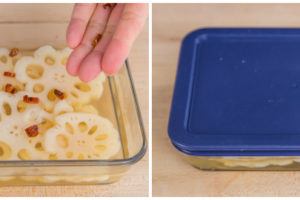
Japanese Ingredient Substitution: If you want to look for substitutes for Japanese condiments and ingredients, click here.
Recipe by Namiko Chen of Just One Cookbook. All images and content on this site are copyright protected. Please do not use my images without my permission. If you’d like to share this recipe on your site, please re-write the recipe in your own words and link to this post as the original source. Thank you.
from Merah Hati Cintaku http://bit.ly/2EUuX5t
via MerahHatiCintaku.blogspot.com